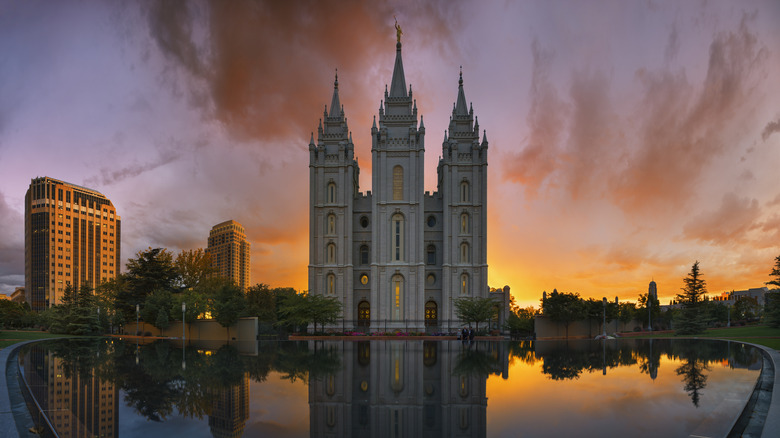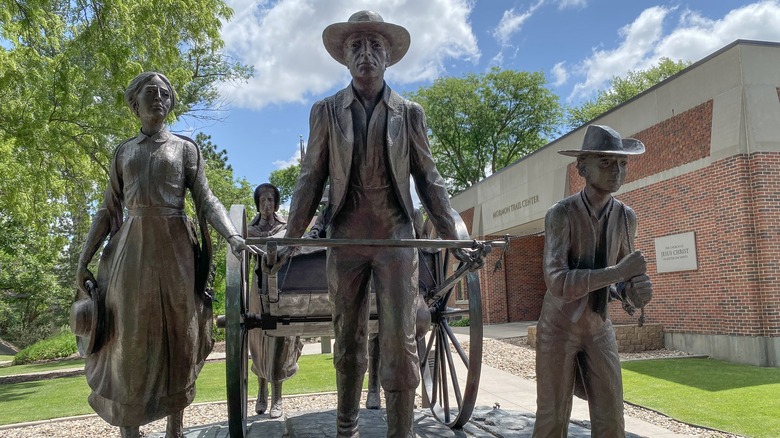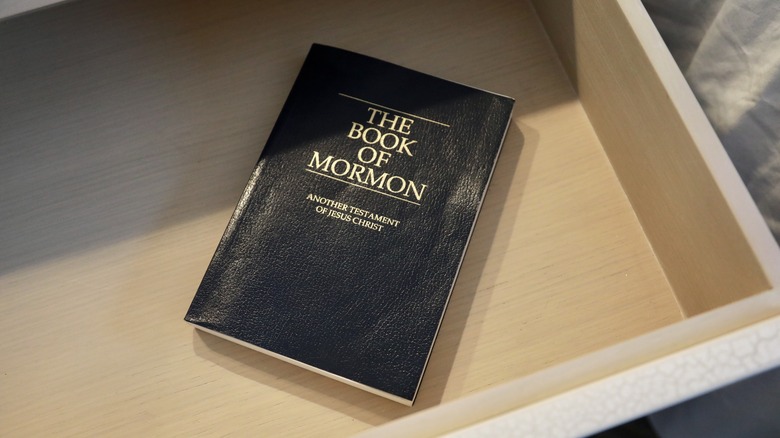Unexpected Rules Mormon Women Have To Follow
For such a well-known religious group, there are certainly a lot of things people don't know or understand about the Mormons, or "Latter-day Saints," as church representatives clarified to CNN in 2019. For instance, why do they wear black and white when proselytizing door-to-door? Do they really practice polygamy? What's up with the whole golden plates thing? Why are there so many of them in Utah? And, are they even categorically Christian?
In this article, we can at least focus on unraveling one Mormon mystery: The role of women in the church. As is often the case for conservative religious sects, the BBC explains that Mormonism advocates a traditional role for women as "righteous daughters of God; good, faithful wives; and loving mothers." These specific roles are defined by the greater, more general role of motherhood within the entire Mormon church body that deems mothers as carers and people who watch after others. So far, this isn't too different from many other faiths and cultures.
Other guidelines for Mormon women are a bit more left of Christian center, or are at least unexpected. Mormon Stories, for instance, says that marriage is a requirement for admission into the highest level of "Mormon heaven," aka the Celestial Kingdom. Mormon women are also not allowed roles in church hierarchy and are all but expected to have kids and raise them at home. On all fronts, the role of women in the religion is defined by a combination of general Christian conservatism and Mormonism's unique doctrinal quirks.
They have traditional, biblically-defined roles
Throughout this article, bear in mind that it's not like there's a cork board in every Mormon household with a list of "Thou shalt not" rules for women. Also, there's not going to be homogeneity across all households and communities, nor do we have perfect insight into the daily, private goings of LDS (Latter-day Saints) individuals. Some of the items in this article are closer to expectations than prescriptive rules.
On that note, it might surprise people just how traditionalist Mormons are regarding women's roles in society, especially when it comes to motherhood. As the Church of Jesus Christ of Latter-day Saints' official website explains, their duties are dictated by a combination of rules laid out in the Bible, texts written by Mormon founder Joseph Smith, and the sayings of church leaders. Referencing the Bible's 1 Timothy 2 and Smith's 1835 book "Doctrine and Covenants," Section 83, Mormon President Ezra Taft in 1987 said: "The Lord has commanded that women and children have claim on their husbands and fathers for their maintenance."
Women taking on the role of helpers mirror that of the biblical Eve. According to the Mormon church's 14th president, Howard Hunter, they have been given a "sacred privilege to bear the souls of men." His words echoed the 12th president, Spencer Kimball, who said that a father "procreates, provides, and loves and directs" and a mother "conceives and bears and nurtures and feeds and trains." No matter how ultra-traditional this general mandate is, an unofficial Mormon Church blog says that "extenuating circumstances" — like deciding if a mother needs to have a job — are "between the family and God."
They can't hold leadership positions in church
In keeping with overall tenets of Mormon traditionalism, women aren't allowed into "the priesthood," i.e., clerical roles in the church hierarchy. "Only men are admitted to this priesthood," the Mormonism 101 blog plainly says. "Women may not speak or act on behalf of God." They can't conduct specific church rituals like baptisms, blessings, and sacraments, nor can they involve themselves in organizational church issues like budgeting. Women can, however, join decision-making boards related to Mormonism's five "auxiliary organizations," defined on the Church of Jesus Christ of Latter-Day Saints website as "Young Men, Young Women, Sunday School, Relief Society, and Primary."
Many sites adopt an implicitly apologetic attitude toward this rule. Some church leaders do, too, like the 10th Mormon president, Joseph Fielding Smith (1876 to 1972). Per Mormon Beliefs, Smith said as far back as 1959, "While the sisters have not been given the Priesthood ... that does not mean that the Lord has not given unto them authority. Authority and Priesthood are two different things." This "Authority" relates to the domains of home, children, care, etc., belonging to women, as we already discussed.
Much like Mormon rules regarding women as mothers, this outlook stems from the Bible itself. The often-quoted passage from 1 Timothy 2 reads: "A woman should learn in quietness and full submission. I do not permit a woman to teach or to assume authority over a man; she must be quiet. For Adam was formed first, then Eve."
They must be married to achieve the highest celestial level
Now we get into territory that departs from general Christian doctrine. As the Church of Jesus Christ of Latter-Day Saints website says of Joseph Smith's text "Doctrine and Covenants," marriage is critical for "exaltation." "In order to obtain the highest degree in the celestial kingdom," the site says, "a man and a woman must enter into the new and everlasting covenant of marriage." The marital bond must be sealed by "the Holy Spirit of Promise" so that the married couple will "have eternal increase."
No doubt this is majorly head-scratching for many people. In a nutshell, and as the Church of Jesus Christ of Latter-Day Saints website once again explains, there are different levels of heaven, aka, the Celestial Kingdom. The truly "exalted" will fuse with God after death, have "all power, glory, dominion, and knowledge" for eternity to the point where they "become gods." For this, there are loads of rules that Mormons have to follow, like "have family and individual prayers every day" and "attend our church meetings." Folks must also be "married for eternity, either in this life or in the next."
Strictly speaking, this marital rule covers both men and women. But because Mormonism places such a strong emphasis on the role of women within marriage, it's hard to see how a Mormon woman wouldn't be all but compelled to get married, no matter what. And yes, this means heterosexual marriage only.
They can't get abortions except in specific circumstances
And so we come to a thorny issue: abortion. In general, abortion is a hard "no" in the Mormon church. The Church of Jesus Christ of Latter-Day Saints website quotes Mormon President Spencer Kimball (1895 to 1985) saying, "Abortion must be considered one of the most revolting and sinful practices in this day," and, "Abortion is a growing evil that we speak against." President Gordon Hinckley (1910 to 2008) likewise said, "Abortion is an ugly thing, a debasing thing, a thing which inevitably brings remorse and sorrow and regret," and, "Abortion is an evil, stark and real and repugnant, which is sweeping over the earth. I plead with the women of this Church to shun it." This rule follows the familiar "You shall not murder" law from the Ten Commandments in Exodus 20.
While that sounds pretty open-and-shut, there's some wiggle room afforded Mormon women. According to the same Church of Jesus Christ of Latter-Day Saints page, Mormon leader Boyd Packer exceptions regarding abortion can be made for "the wicked crime of incest or rape," if "the life of the mother is in jeopardy," or if a "severely defective fetus cannot survive birth." Even so, "much sober prayer" is required to come to a decision. Carrying a baby to term and putting it up for adoption is also an option, including for cases of women getting pregnant before marriage. So yes, Mormon women follow the same precedent true of Christian conservatives in general: no premarital sex.
Mormon women should dress modestly
There are lot more gray areas we could cover regarding rules for Mormon women, but one such area stands above the rest for its impact on everyday life: clothing and appearance. While there are no hard dictates regarding Mormon women's clothing, Mormonism 101 says that modesty is the guiding principle. Dress adheres to the conventions of the day, but errs on the side of "modest" and "feminine" as a sign of respect, and Mormon leader Dallin Oaks said this is so that women's bodies don't "become 'pornography to some of the men who see' them." Also, women shouldn't "wander around looking like men" and should "put on a little lipstick now and then and look a little charming." This means that makeup and styled hair is fine provided they fall within notions of decorum.
That being said, Mormon women generally feel pressured to wear dresses to church, as The New York Times wrote in 2012. Officially, "Church members are encouraged to wear their best clothing as a sign of respect for the Savior." Nonetheless, there's a lot of expectation built up in Mormon communities regarding propriety and tradition. To wit: There was a short-lived "Wear Pants to Church Day" within the Mormon church in 2012 that garnered more negativity than praise. One Mormon man said, "Women who want to wear pants, they just don't know how to follow the Lord." Another threatened to shoot women who went to church in pants. Another Mormon woman said that she was the only one to wear pants in a room of 50 women.





